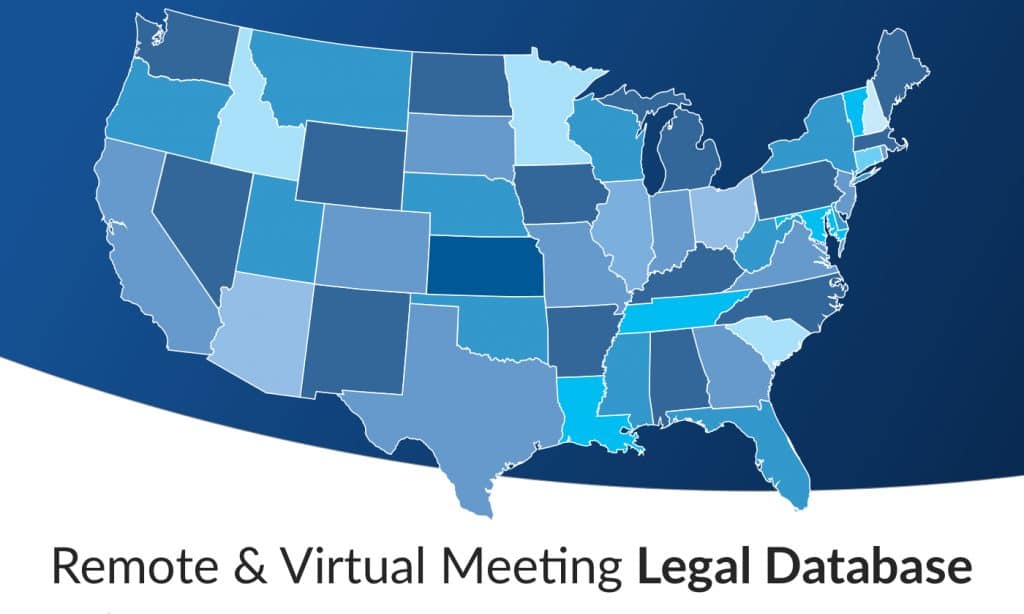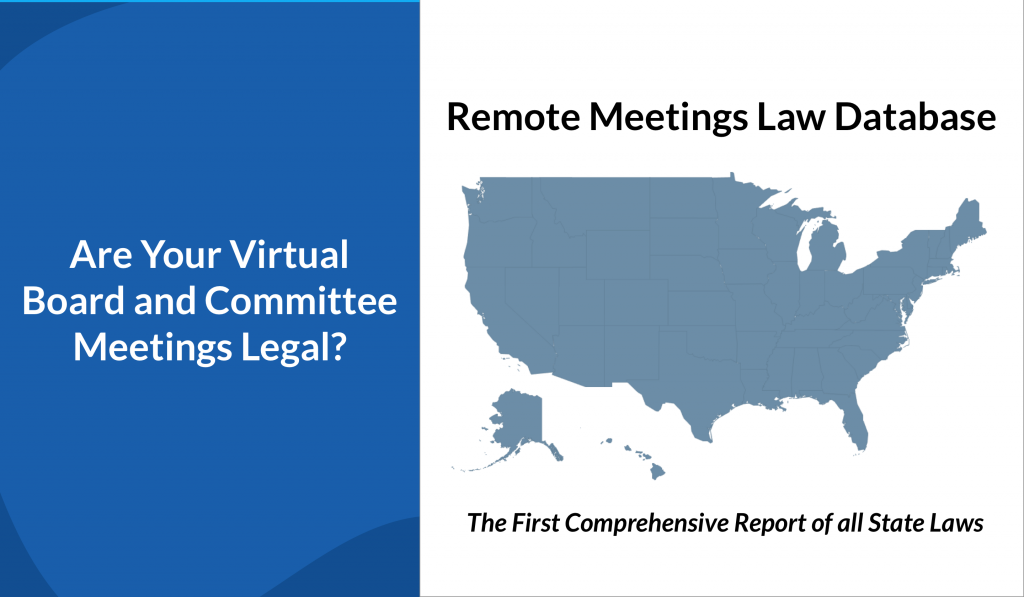
Life is unpredictable. While there’s much to be said about the value of in-person meetings, it can become impossible to gather everyone in the same room. Natural disaster, illness, or even a stalled car can lead to an unexpected absence and a failed quorum.
Technology came a long way toward solving this problem even before COVID-19 and social distancing. We know everyone works remotely now and board meetings have gone virtual. Organizations have ramped up their investment in virtual meeting tools that enable leaders to connect and make decisions remotely and even while in multiple locations. The result: CEOs and board directors can hold virtual meetings all without ever needing to get on a plane, check into a hotel, or find a seat in an actual boardroom,
So let’s start with a very important question – is it even legal for you to have a virtual meeting?
The first comprehensive report of all state laws
State law governs if and how companies and nonprofits conduct virtual board meetings. Nearly every state explicitly authorizes virtual board meetings and those that don’t are silent on the subject. It’s important to note that the state which controls your business is where you’re incorporated, not where you have an office.
We’ve put together the first comprehensive report of all state laws that govern virtual board meetings for both corporations and nonprofits. This thorough examination reveals that nearly every state permits virtual attendance.
Our report turned up some interesting results.
- First, most state laws read very similarly. For example, if you’re incorporated in Delaware (like more than half of all publicly traded companies in the United States), then you’re in luck and the question of legality is unambiguous:
Unless otherwise restricted by the certificate of incorporation or bylaws, members of the board of directors of any corporation, or any committee designated by the board, may participate in a meeting of such board, or committee by means of conference telephone or other communications equipment by means of which all persons participating in the meeting can hear each other, and participation in a meeting pursuant to this subsection shall constitute presence in person at the meeting.
- Another interesting detail: many states have an explicit requirement for audio quality. The technology you use to communicate really can’t be subject to failure.
- Finally, every state law we examined ultimately leaves the final decision to the organization itself: Unless prohibited by the articles or bylaws of the corporation .. organizations may legally conduct a remote meeting.
Key Takeaway
For most companies and nonprofits, you’re almost certainly in the clear to hold a virtual meeting when it comes to the law. But don’t assume. Check your state’s laws in our database, and make sure you’re in full compliance.
Amidst all the confusion and disruption of recent days, there’s one thing that can be said with 100% certainty: leaders are facing challenges on an unprecedented scale. Practically all businesses and non-profits have had to switch to remote operations overnight. And they’ve had to do it with little to no preparation.
Now more than ever, leaders must find a way to leverage technology to enable fast and smart decision making while working remotely. Virtual meeting platforms like OnBoard help make this possible. Additionally, powerful Zoom integrations make it simple and easy to connect your favorite video conferencing technology.
Standard Disclaimer
If you have serious questions about where you stand legally, it’s always best to consult legal counsel and get the official thumbs up.
In our next post, we turn to your board’s rules of incorporation and bylaws.
About The Author

- At OnBoard, we believe board meetings should be informed, effective, and uncomplicated. That’s why we give boards and leadership teams an elegant solution that simplifies governance. With customers in higher education, nonprofit, health care systems, government, and corporate enterprise business, OnBoard is the leading board management provider.
Latest entries
 Board Management SoftwareJuly 26, 20225 Critical Board Engagement Survey Questions
Board Management SoftwareJuly 26, 20225 Critical Board Engagement Survey Questions Board Management SoftwareJuly 19, 2022What is an Advisory Council? (Overview, Roles, and Responsibilities)
Board Management SoftwareJuly 19, 2022What is an Advisory Council? (Overview, Roles, and Responsibilities) Board Management SoftwareJuly 15, 2022Balance Sheet vs. Income Statement: What’s the Difference?
Board Management SoftwareJuly 15, 2022Balance Sheet vs. Income Statement: What’s the Difference? Board Management SoftwareJuly 12, 2022Sweat Equity: Mark Haas of the Dallas Cup Board Gives a Nonprofit Play-by-Play for Success
Board Management SoftwareJuly 12, 2022Sweat Equity: Mark Haas of the Dallas Cup Board Gives a Nonprofit Play-by-Play for Success

